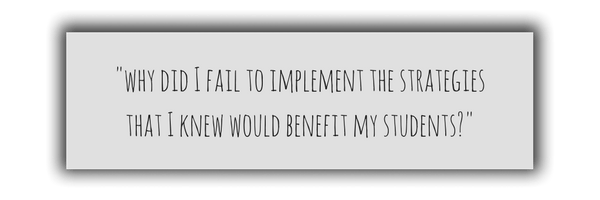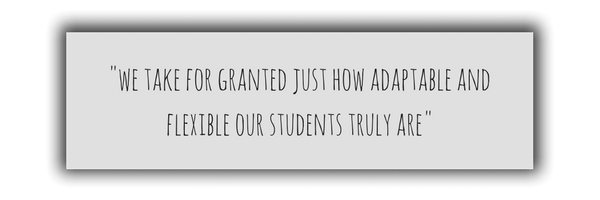
Mr. Trepxe learned some incredible new strategies and added some profound new tools to his teacher toolbelt. He was confident in the increased engagement his students would experience by implementing them. He believed in the academic and non-academic benefits they would bring to his classroom.

But by the time the school year ended, he had implemented none of them.
Why?
This might be a hypothetical scenario for the purpose of this post, but I will be among the first to confess that I have been this teacher. More than once. And I would venture a guess that many can relate. In fact, we see this almost constantly. While there are many reasons, I want to reflect on one of the more common ones and share insights that have been delivered directly from the experiences of teachers just like you.
Why did I, like Mr. Trepxe and so many others, fail to implement the ideas or strategies that I knew would benefit my students and my classroom experience? I was worried that my students couldn’t handle it.
It’s a reasonable concern. What happens if I change up the familiar routines halfway through a term? What happens if I introduce too many new tools and systems to students who are only just learning how to “do school”? Or what might be the consequences of trying something only to find that it did not work as desired and will need to be changed or scrapped entirely? All these things simply create increased anxiety, mounting frustrations, constant interruptions, and endless setbacks… right?
Well…
Not necessarily. Consider this lesson that most teachers learn in their first few years. If I stop the entire class to address a behavioral issue every time a student misbehaves, what would my day look like? So I develop systems and routines for both the students and myself to ensure that all but the most significant concerns are handled quickly and quietly.
Or what about this one (slightly more controversial): if I reteach the entire class a concept every time one student struggles with it, what would my year be like?

My point, however, is that we actually constantly take for granted just how adaptable and flexible our students truly are. Consider the reality that every time a student is subjected to the tutelage of a different teacher, that student must learn the subtleties of the new teacher, and not merely the explicit routines and structure, but more importantly the implicit preferences and expectations. And do you know the amazing thing? Students pull it off, most of the time without teachers ever even noticing! They do it because they must and they can.
And that is only one minute detail in the constant barrage of shifting experiences and expectations in a student’s day. Consequently, I might be tempted to say that adding one more thing to which a student must adapt only serves to exacerbate the already muddled mind of that student.
Once again, consider the implications, though. The thing that I am trying to add is the very thing intended to increase engagement, to improve the learning experience. If my students were aware of that and on-board with the ultimate goal of it, how might they respond to such changes?
Here’s the message, and it comes straight from the teacher next door: try new things! Not only can students handle it, but chances are, they are even more comfortable with some of those things than they were with the old things. So try new things. But take into account the students, and bring them into the loop. Establish goals with such changes together and allow students to support you as you work toward those goals. Not sure how to proceed? Ask your students! Stuck on a tool or strategy? Ask your students!
Most new teachers are told to “Fake it ‘till you make it.” That never worked for me. It was exhausting, and the students always knew anyway. Few days were better than those that began with, “Today, we are going to try something new…”


